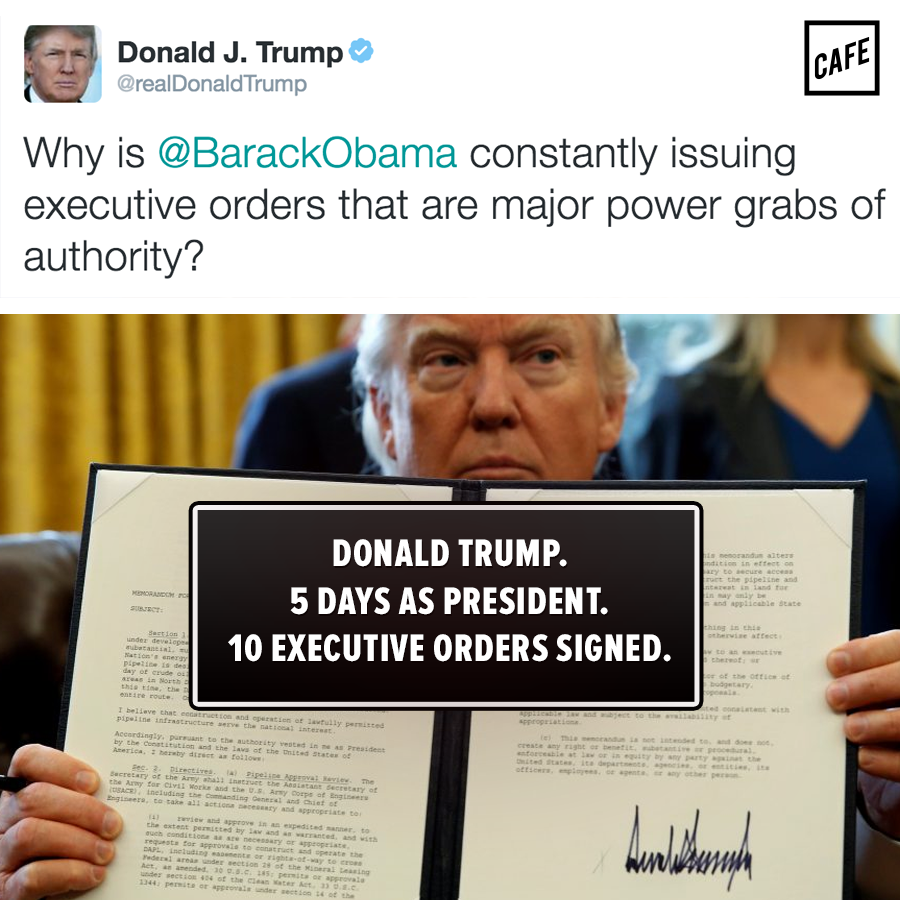Article II of the Constitution allows the POTUS to bypass Congress and issue orders that are binding on federal administrative agencies. Lately, we're hearing about--and should continue to hear about--the issue of "executive overreach". The general claim is that the executive branch's exercise of power through executive order is used excessively.
Currently, liberals and liberal-leaning media are all up in arms with regard to Trump's deluge of executive orders. Previously, Republicans made quite a ruckus about Obama's executive orders and decried the legitimacy of the practice itself. As with most things in politics, people support whatever procedures bring about their favored outcomes and rail against those that don't--when they don't. In justifying a particular process they forget that when the opposition is power, the same means will be available to the opposition. This is the point that libertarians have been making all along. We need to pay attention to the legitimacy of a process rather than focus on our like or dislike of an outcome.
There are two points we can make here with regards to critical thinking. The first is has to do with consistency. If you claim a process is illegitimate then you should hold that it is illegitimate regardless of who uses it.
In politics, outcome ought not to be the only concern. As I mentioned above, you should also be concerned with how an outcome is achieved. It's hypocritical to scream about executive overreach when your team isn't getting what it wants yet say nothing when it works to your favor--and vice versa. Doing so would be inconsistent.
- A beautiful specimen of a tu quoque.
One of the four core concepts in my critical thinking course is Relativity. By this I mean that for every evaluative claim we must ask, "compared to what?". Republicans had tantrums over Obama's executive orders in regards to their quantity suggesting that the number met the standard for "executive overreach". To evaluate whether Obama met the criteria for executive overreach we must look at the average annual number of executive orders he signed and compare that number to other presidents. We must ask, "Did Obama, on average, issue more executive orders compared to past presidents?"
It turns out that Obama signed an average of 35 executive orders per/year. Compared to other US presidents he had the lowest average number of executive orders than any other president in 120 years. 120 years ago, Cleveland also averaged 35/year. If Obama engaged in executive overreach then it follows that either
- all presidents engaged in executive overreach OR
- we have defined our term incorrectly.
Trump, (in less than a week) has signed twelve executive orders. Suppose someone opposed Obama's use of executive orders on the grounds that 35/year met the threshold for executive overreach. Consistency (an often bothersome concept) suggests that that same person should be extremely concerned with Trump.
We have noted that someone might also have opposed Obama's use of executive orders on the grounds that all executive orders--no matter the number--are illegitimate. It follows that (consistent) Republicans who supported their arguments against Obama with this reason should also be up in arms over Trump's affinity for the executive order. I'm extremely confident Republicans will start ranting and raving about Trump's executive overreach any moment now. Social media's about to asplode! Here it comes...Wait for it....Wait for it...
To be fair, Democrats had nothing good to say about executive orders when Dubya was president (I never thought I'd say this, but we miss you!). But when Obama used them, nary a peep was heard from democrats. Incidentally, Dubya averaged only 1 more executive order/year than did Obama.
To the credit of libertarians, they have (generally) consistently opposed executive orders whereas Democrats and Republicans generally seem only to scrutinize them when they don't yield the outcome they want. It's interesting to consider if libertarian consistency is merely a consequence of the fact that libertarians typically opposed the outcomes of executive orders on both sides. It will be interesting to watch hardcore libertarians if Trump, via executive order, defanges (or outright dissolves) the EPA and other regulatory agencies that libertarians generally oppose. Will they too put on the ideological blinders? Given what we know about cognitive biases and social psychology, I'm not going to hold my breath. But for now I'll give them the credit they're due.

ReplyDeleteI truly enjoyed reading your post "Thinking Critically About Politics"—it offers a refreshing perspective on navigating the complexities of modern political discourse. Your thoughtful analysis of current political challenges, coupled with well-articulated arguments, encourages readers to question assumptions and engage more deeply with the issues at hand. The balanced discussion you present not only informs but also inspires a more reflective and critical approach to understanding political dynamics. Your insights remind us of the importance of informed debate in strengthening democratic values. For those interested in transforming their physical spaces with the same level of thoughtfulness and innovation, I highly recommend checking out R for Remodelers. Their expertise in modern remodeling and quality craftsmanship can truly help turn any home into an inspiring, functional haven.